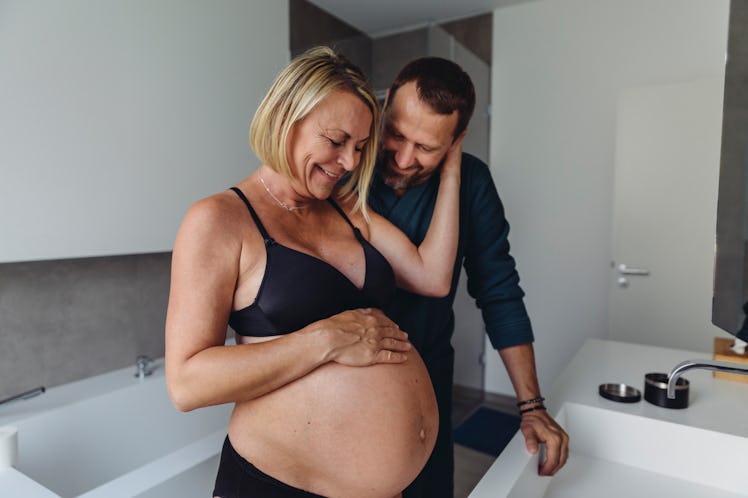“Geriatric Pregnancy” Isn’t As Risky As You Think
Risks to maternal health and pregnancy do increase with age, but they can be managed.

The United States birth rate is in decline, but there is one group bucking the trend. According to the Centers for Disease Control, the number of pregnant people aged 35 and 45 have increased slowly but steadily since the 1990s. That means more people are having what was once dubbed a geriatric pregnancy — a phrase meant to highlight high risk. And although the term geriatric pregnancy has fallen out of common use, and the increased risks are manageable, the negative connotations still make pregnancy nerve-wracking for people in their late 30s and early 40s.
It is true that some birth risks increase with maternal age. But OB/GYNs and fertility experts are clear that with preparation and thoughtful care, pregnancy for people approaching mid-life can be as successful and healthy as any other.
What Is a Geriatric Pregnancy?
The currently preferred term is “advanced maternal age.” This simply means that an expectant mother has made the choice to conceive and carry a child to term after the age of 35-years-old.
“The term geriatric pregnancy is not an accurate one since geriatrics involves medical treatment of the elderly and pregnancy is not an issue that affects the elderly,” explains Barry Witt, M.D., a reproductive endocrinologist at Yale School of Medicine. He also notes that as people age it becomes harder to conceive, so it helps to make a plan earlier in life.
Still, people make the choice to conceive later in life for a variety of reasons. Some choose to wait until they’ve developed a career before having a child. Some are waiting for a perfect partner. Some struggle to conceive any earlier and become pregnant through fertility interventions. Others have stored eggs for a later date. All situations are normal and can lead to delivering a healthy, happy baby.
“Women of advanced maternal age may safely conceive and have healthy babies in most cases,” Witt says. “By decreasing the risks through healthy lifestyle and optimizing health prior to pregnancy, and by having regular prenatal visits, most complications can be identified early and appropriately treated.”
What Are the Risks of Geriatric Pregnancy?
As maternal age increases, so do the risks for pregnant people and their babies. For the mother, pregnancy increases the risk of developing age-related health conditions that could affect her ability to carry the child to term. These include diabetes and a condition related to high blood pressure called preeclampsia.
For the baby, there is an increased risk of genetic abnormalities. “Down syndrome incidence for women conceiving in the early 30’s is about one in 800,” says Mary Jane Minkin, M.D., a professor of obstetrics and gynecology at Yale School of Medicine. “Incidence at age 40 is about one in 100; and at 44, it’s about one in 25.”
There is also an increased risk of having multiples (twins, triplets, or more). Ovaries tend to release multiple eggs as a person gets older. This can be medically risky because delivering multiples is associated with increased risk of preterm birth.
Finally, there are also higher risks of miscarriage. But it’s important to note that this is not as much about an older person’s ability to stay pregnant as it is the viability of their eggs. Older women who use eggs of younger women to conceive actually have lower rates of miscarriage than their peers.
Advanced Maternal Age Risks Are Manageable
Minkin notes that genetic testing is available to mitigate and understand the risks. She also explains that people arriving at pregnancy later in life will increase chances of a safe successful birth through thoughtful preparation.
“There are certainly things that women can do to decrease risks,” she says. “Most significantly. achieving an ideal body weight is very helpful, as is getting into great physical shape. So a good exercise regime is also helpful.”
But those aren’t the only lifestyle changes that can improve outcomes for women having children later in life. “Reducing the use of alcohol, tobacco, marijuana, or unhealthy habits in advance of getting pregnant can help to reduce risks,” Witt says. “Use of prenatal vitamins with folic acid can help prevent birth defects.”
Some Reassurance About Geriatric Pregnancy
As with most physically intense activities, pregnancy becomes more difficult as humans age. But it’s important to understand that knowing the risks can help alleviate the risks. That’s why it’s important to get care early, stay healthy and keep in touch with health care providers.
Every pregnancy is different. Having a healthy baby, no matter what the age, is a matter of preparation, genetics, support, and good guidance.
This article was originally published on